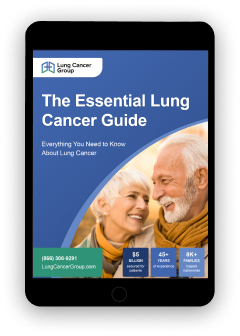Lung Cancer Treatment
Doctors can use several treatments to help patients with lung cancer live longer. Top lung cancer treatments include surgery, chemotherapy, radiation therapy, targeted therapy, immunotherapy, and more. Learn about the different lung cancer treatment options and if you can get help to afford them below.
What Is Lung Cancer Treatment?
Lung cancer treatment allows doctors to remove, destroy, or shrink tumors so that you can live longer and with fewer painful symptoms.
Commonly used lung cancer treatments include:
- Chemotherapy
- Immunotherapy
- Radiation therapy
- Radiofrequency ablation
- Surgery
- Targeted therapy
- Palliative treatments
- New treatments in clinical trials
Oncologists (cancer doctors) often use one or more treatments together for the best results. Treatments you’ll be eligible for vary depending on the type of lung cancer you have, how far it has spread (cancer stage), your overall health, and many other factors.
Lung cancer treatments are often expensive. Thankfully, you may be eligible to pursue financial compensation after a lung cancer diagnosis to cover these costs and get the care you need.
Get a Free Lung Cancer Guide to learn more about treatments and how to afford them.

- Understand risk factors
- Find top treatments
- Pursue compensation




Types of Lung Cancer & Treatment Options
There are different types of lung cancer, and treatment options vary for each.
Types of lung cancer include:
- Non-small cell lung cancer (NSCLC): NSCLC tumors are made up of cells that spread slowly. Surgery is the most common option for NSCLC patients diagnosed before the cancer has spread, but other treatments can be used too.
- Small cell lung cancer (SCLC): These cancer cells are smaller and spread faster than NSCLC cells. SCLC is usually treated with radiation and chemotherapy, but surgery is also an option in rare cases.
Doctors can recommend effective treatments depending on which type of lung cancer you’re diagnosed with.
Surgery


Lung cancer surgeries are typically used in cases of early-stage NSCLC.
Lung cancer surgery options include:
- Wedge resection: A small part of lung tissue containing tumors is removed.
- Segmental resection: Here, doctors take out a segment of the lobe (one of the lung’s inner chambers) closest to the lung tumors.
- Lobectomy: A lobectomy allows doctors to remove an entire lobe so the cancer doesn’t spread to other areas of the body. It’s the most common lung cancer surgery, according to the American Lung Association (ALA).
- Sleeve resection: If cancer is found in part of the bronchus (a passage that feeds air into the lungs), doctors can perform a sleeve resection to remove the cancerous bronchus and closest lobe.
- Pneumonectomy: Doctors remove an entire lung with this surgery. This is only done in very severe cases.
Life-extending surgery is not usually performed on late-stage NSCLC patients as doctors won’t be able to remove all the cancer. Doctors may use minor surgeries as palliative (pain-relieving) care though.
Surgery is also used to treat SCLC if doctors find just one cancer tumor in the lungs. However, fewer than 5% of SCLC patients will be able to undergo surgery.
It can take several months to recover from a lung cancer surgery, according to the American Cancer Society (ACS). Some patients may suffer from side effects like fatigue, blood clotting, infections, and pneumonia. But, the potential benefits of surgery — including the chance to be fully cured or achieve long-term survival — make it an important treatment to consider.
Chemotherapy
Chemotherapy uses medication to kill cancer cells. It is one of the most widely used lung cancer treatments. Chemotherapy can help treat SCLC and NSCLC at any stage.
Doctors can use chemotherapy:
- By itself: Chemotherapy may be the main lung cancer treatment used in patients with stage 3 or stage 4 NSCLC if surgery isn’t possible.
- With surgeries: Doctors may give doses of chemotherapy before surgery to shrink tumors or after surgery to destroy cancer cells that may have been left behind.
- With radiation: Chemoradiation (chemotherapy and radiation therapy together) is often used to treat early-stage SCLC, as well as advanced NSCLC.
- With other treatments: Chemotherapy can be used alongside immunotherapy, radiation, and/or targeted therapy to treat cases of late-stage lung cancer.
Doctors will spread out your chemotherapy doses to limit side effects like fatigue and nausea. This is called giving chemotherapy in cycles.
Call (877) 446-5767 to get help affording chemotherapy and other lung cancer treatments. Our team can answer any questions you have.
Radiation
Radiation therapy (also known as radiotherapy) uses energy beams to destroy cancer cells and tumors. Doctors can use radiation therapy on its own or with other treatments to help lung cancer patients.
Types of radiation for lung cancer include:
- External beam radiation therapy (EBRT): This is the most common type of radiation used to treat both SCLC and NSCLC. Doctors use a machine to send radiation through your lungs and to kill cancer cells.
- Brachytherapy: Doctors put a radioactive substance directly into the body to shrink the tumors. It is also known as internal radiotherapy.


The type of lung cancer you have and how far it has spread will affect which type of radiation will be used.
Radiation can also destroy healthy cells along with cancerous ones, leading to side effects like hair loss and fatigue. Doctors will do all they can to limit these side effects.
Immunotherapy
Immunotherapy boosts the body’s immune system so it can fight cancer.
The immune system normally knows how to kill bad cells or viruses. But, since lung cancer cells are mutations of healthy ones, they may hide from the immune response. Immunotherapy prevents this so the cancer can be killed.
Immunotherapy drugs used to treat lung cancer include:
- Atezolizumab (Tecentriq®)
- Nivolumab (Opdivo®)
- Pembrolizumab (Keytruda®)
Immunotherapy can be used alongside other lung cancer treatments like chemotherapy to treat both SCLC and NSCLC.
Get our Free Lung Cancer Guide to find out more about how immunotherapy and other lung cancer treatments could help you.




- Understand risk factors
- Find top treatments
- Pursue compensation




Targeted Therapy
Lung cancer cells have mutations that set them apart from healthy cells. Targeted therapy medications allow doctors to hone in on these mutations to destroy the cancer.
For example, some targeted therapies prevent cancer cells from creating the blood vessels they need to grow. Without these blood vessels, cancer cells will die.
The National Cancer Institute (NCI) notes that targeted therapy doesn’t cause as much harm to healthy tissue, so patients may have fewer side effects than if they were treated with chemotherapy or radiation.
Radiofrequency Ablation
With radiofrequency ablation, doctors insert a needle into a lung cancer tumor. The needle sends out electricity to kill cancer cells and shrink the tumor.
Doctors may use this type of treatment if surgery can’t be done. They may use radiofrequency ablation by itself or along with chemotherapy and radiation.
Clinical Trials and Lung Cancer Treatments
Doctors continue to perform lung cancer research in clinical trials to find other treatments for lung cancer. These trials test new therapies to help patients live longer or with fewer symptoms.
Hundreds of lung cancer clinical trials are currently happening at thousands of hospitals and cancer centers across the country.
Ask your doctor if you qualify for any lung cancer treatments offered in clinical trials.
Palliative Care for Lung Cancer
Palliative care is pain-relieving treatment. It can ease lung cancer symptoms and improve quality of life.
Doctors often recommend palliative care if a patient’s lung cancer is too advanced and other treatments won’t help them live longer. Palliative care for lung cancer can also be used alongside life-extending treatments to ease discomfort.
Palliative care options include:
- Draining pleural effusions (buildup of fluid in the lung lining)
- Getting supplemental oxygen
- Giving low doses of radiation
- Inserting a catheter into the lung lining to drain fluid
- Placing a stent (small tube) in the airway to help with breathing
- Taking medications to ease pain and improve breathing
- Using laser therapy or photodynamic (light-based) therapy to shrink tumors
Contact us now to learn how we can help you afford palliative care and other treatments for lung cancer.
Alternative Lung Cancer Treatments


Always talk to your doctors before starting any alternative treatments. You shouldn’t replace standard treatments with any alternative ones.
Some alternative treatments promise a miracle cure for cancer, and this is simply not true. Some can even be harmful without doctor supervision, such as substantially changing your diet.
However, other alternative treatments may help you feel more calm and reduce symptoms as long as they’re done with the approval of your cancer care team.
Types of Doctors Who Treat Lung Cancer
Many doctors across the country treat lung cancer. You may have more than one lung cancer doctor on your care team depending on what treatments you need.
Doctors that offer lung cancer treatments include:
- Medical oncologists: These doctors use chemotherapy and other drugs to shrink cancer tumors.
- Palliative care specialists: You can work with these doctors to ease symptoms of lung cancer.
- Pulmonologists: Pulmonologists specialize in lung-related disorders. They can help you manage issues with breathing and check a biopsy (tissue/fluid sample) to see if you have lung cancer.
- Radiation oncologists: These doctors use radiation to kill cancer cells. They’ll determine which type of radiation (if any) will help you.
- Thoracic surgeons: Thoracic surgeons remove cancer tumors with surgery.
Your primary doctor can help you find specialists who treat lung cancer after you’re diagnosed.
How Lung Cancer Treatments Affect Prognosis
Lung cancer treatments are the main way to improve a patient’s prognosis (expected health outlook).
The average lung cancer prognosis is under two years, but with the right treatments, patients may be able to extend their life expectancy or become fully cured and long-term survivors.
In 2023, the National Cancer Institute (NCI) published a study of two different surgeries for early-stage NSCLC patients. Some patients had only part of a lung lobe removed while others had the entire lobe with the cancer tumor on it taken out.
The 5-year lung cancer survival rates were roughly 80% for both groups, meaning 8 out of 10 patients were still alive 5 years later.
Even late-stage patients can become lung cancer survivors thanks to treatments. For example, Jim was diagnosed with late-stage asbestos lung cancer in 2005 but thanks to a combination of chemotherapy, surgery, and radiation, he is still alive today.
Affording Lung Cancer Treatment Costs
Lung cancer treatments can be very costly. The cost of lung cancer care without insurance is over $140,000, according to a case study from the ACS. Further, you may still have to pay tens of thousands of dollars out of your pocket even if you have insurance.
A lung cancer diagnosis is stressful enough — paying for lung cancer treatments shouldn’t be. Lung Cancer Group can help you get compensation to cover the costs if you were exposed to asbestos.
Makers of asbestos-containing products knew that asbestos exposure could cause lung cancer and other illnesses. Instead of protecting lives, they continued to profit off their products.
You can hold these companies accountable by taking legal action with help from our partner attorneys.
Here are some payouts our legal partners have secured for past lung cancer patients:
- $3 million for a Missouri woman
- $2.77 million for a Tennessee pipefitter
- $2.18 million for an Illinois electrician
- $2 million for a California construction worker
- $2 million for a New York railroad worker
- $1.95 million for a Colorado man
Our team may be able to help you — even if you have lung cancer but aren’t certain you were exposed to asbestos. Get started now with our Free Lung Cancer Guide.




- Understand risk factors
- Find top treatments
- Pursue compensation




Get Help Finding Lung Cancer Treatment
If you or a loved one has been recently diagnosed with lung cancer, you’ll need to get treatment to live longer. Doctors can use treatments like surgery, chemotherapy, radiation, and more to help you.
With different lung cancer treatments, you might:
- Be fully cured
- Become a long-term survivor
- Live with less symptoms and pain
Lung Cancer Group has helped many other patients understand their treatment options and get the compensation needed to pay for medical care. We’ve secured millions of dollars for some patients, meaning they didn’t have any financial worries on top of dealing with a cancer diagnosis.
We may be able to assist you and your family too. Call (877) 446-5767 or get a Free Lung Cancer Guide now to learn more.
FAQs About Lung Cancer Treatment
Can you survive with lung cancer?
Yes. It may be possible for you to survive lung cancer with treatment, no matter your diagnosis.
There are many accounts of lung cancer patients — even those diagnosed in later stages — living for 20 years or more.
Getting lung cancer treatments gives you the best chance of becoming a long-term survivor. Ask your doctor about which lung cancer treatments will be most effective in your case.
Can you be cured from lung cancer?
While there isn’t a cure for all cases of lung cancer, your doctor may consider you to be cured if the cancer is diagnosed and treated at an early stage.
In fact, the American Society of Clinical Oncology (ASCO) notes that up to 90% of early-stage small cell lung cancer (SCLC) patients can be cured.
Even if you’re diagnosed with advanced lung cancer, you may still be able to live longer or possibly achieve remission (where signs of cancer are fully or partially gone) with treatment.
Call (877) 446-5767 to get help affording the lung cancer treatments you need to live longer.
Can you live 20 years after lung cancer?
Yes, it may be possible for you to live for 20 years after a lung cancer diagnosis with the right treatments.
For example, Nadine was diagnosed with non-small cell lung cancer (NSCLC) at the age of 27. She is still alive today after undergoing a variety of treatments, including chemotherapy, targeted therapy, and surgery.
Doctors can recommend the most effective treatments that may help you become a lung cancer survivor.
What is the best treatment for lung cancer?
The best treatment for your lung cancer will depend on the type of lung cancer you have, how far it’s spread, your overall health, and other factors.
For example, Yale Medicine notes that surgery is the best treatment for patients with NSCLC that hasn’t spread very far. Patients with SCLC are usually treated with chemotherapy and radiation.
How is asbestos lung cancer treated?
Exposure to asbestos can cause any type of lung cancer, so treatments for asbestos lung cancer will not vary from other lung cancer treatments.
Options like surgery, radiation, chemotherapy, immunotherapy, and more will instead depend on the specific type of lung cancer — SCLC or NSCLC.
Asbestos lung cancer is sometimes confused with mesothelioma, another asbestos-caused cancer that affects the linings of major organs.
Mesothelioma and asbestos lung cancer require different treatments. It’s important to get correctly diagnosed so you get properly treated.
Get a Free Lung Cancer Guide for help affording lung cancer or mesothelioma treatments.
How does stage affect lung cancer treatment?
The stages of lung cancer can greatly affect the types of treatment you receive.
Early-stage lung cancer is much easier to treat since it is contained in one area of your lung. This means doctors can often remove the tumors with surgery or destroy them with chemotherapy and radiation.
Late-stage lung cancer is harder to treat as the tumors may have spread into other parts of your body like the lymph nodes, bones, or brain. Chemotherapy, radiation, and other treatments can be used to shrink cancer tumors and help you live longer.
Doctors can recommend lung cancer treatments by stage after confirming your diagnosis.
How can I access lung cancer treatments?
Your health care team will want to confirm your lung cancer diagnosis before recommending treatments. Doctors use imaging tests such as chest X-rays or CT scans to identify possibly cancerous tumors in your lung tissue.
After this, they’ll take a biopsy (sample of cancerous fluid/tissue) to confirm your diagnosis. You and your doctors can then come up with a treatment plan that best suits your needs.

